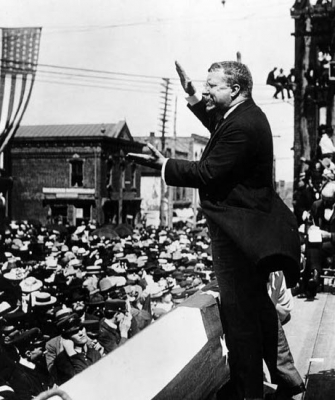
On April 23, 1910, former U.S. President Theodore Roosevelt delivered what would become one of the most quoted speeches of his career, titled ‘Citizenship in a Republic’ at The Sorbonne for the University of Paris.
Theodore Roosevelt is remembered as one of the most robust Presidents in US history. His journey to become a symbol of America’s strength and vitality is an inspiration for many. Let’s revisit his monumental 1910 address in Paris, titled Citizenship in a Republic.
According to historian Edmund Morris’s biography Colonel Roosevelt, the audience for this address included ministers in court dress, army and navy officers in full uniform, nine hundred students, and an audience of two thousand ticket holders.
This speech, which is also popularly known as The Man in the Arena, went on to become so influential that it was printed for tens and thousands of French school children. It was translated across Europe and turned into a pocketbook that sold 5.000 copies in just five days.
Roosevelt’s America
History records that growing up, the 26th President of the U.S. found himself standing at the hinge of history. He was the leader of a new generation, one that had not witnessed the civil war first-hand. His presidency marked a beginning of a progressive era in politics that re-evaluated the moral conundrums and choices of the past.
Roosevelt’s America was wrestling with profound challenges. Industrialisation and immigration meant that the cities were overcrowded and the working conditions at the factories were deteriorating by the day, and in the South. African-Americans were losing many of their voting rights, whereas women were still fighting to get the right to vote in the first place, business was booming and consolidating into various Trusts and monopolies. But in spite of all this, people were optimistic that the tools, technology, voices, and ideas of this time could solve all these problems.
Leadership distilled into action
Few men have had as much action in their life as Theodore Roosevelt. For average American citizens, his name conjures up images of Big game hunting, the Panama canal, glasses, his iconic grin, and moments that make him seem larger than life.
He was called by many the first media-conscious President the nation has ever seen. His pictures were everywhere, his likeness appeared in countless cartoons, his quotes passed from citizen to citizen and a record of his public life filmed for posterity flickered on every screen. He used the Oval office to preach the virtues of action and social reform. His rebellion against corporate greed and crooked politicians gave him the name and reputation of being a loose cannon that seldom missed a shot. One of history’s supreme examples of leadership distilled into action. Roosevelt preached that the most effective way to learn was to do so by observation and true to these words, he led by example.
The Man in the Arena In his 1910 speech at The Sorbonne, he declared “Today I shall speak to you on the subject of individual citizenship… The average citizen must be a good citizen if our republics are to succeed… the main source of national power and national greatness is found in the average citizenship of the nation. Therefore it behoves us to do our best to see that the standard of the average citizen is kept high” (excerpt from Citizenship in a Republic)
He further points out that the biggest problem with the system of higher education was that it made one a cynic and even took pride in it. Such an education (which was a privilege in itself) strips us of emotions and beliefs and reduces us to mere commentators who only know how to criticise “the way others do what they themselves dare not even attempt”.
He explains, “It is not the critic who counts: not the man who points out how the strong man stumbles or where the doer of deeds could have done them better. The credit belongs to the man who is actually in the arena, whose face is marred by dust and sweat and blood: who strives valiantly: who errs, who comes short again and again, because there is no effort without error and shortcoming; but who does actually strive to do the deeds; who knows the great enthusiasms, the great devotions; who spends himself in a worthy cause; who at the best knows, in the end, the triumph of high achievement, and who at the worst, if he fails, at least fails while daring greatly…” (excerpt from Citizenship in a Republic) His entire understanding of leadership came down to the fact that actions speak louder than words. And his political career is a testament to his devotion to his country and his belief in this philosophy.
The combination of his manic energy, wide-ranging interests, and his extraordinary intellect at the turn of the 20th Century made him one of the most remarkable leaders the country has ever seen.
DID YOU KNOW?
1. Roosevelt was the first President to win a Nobel Peace Prize. He received this honour for having negotiated peace in the Russo-Japanese war in 1904-05.
2. Roosevelt is to date the youngest man to have served as the President of the U.S.
3. Roosevelt sparked a scandal when he invited the African-American educator Booker T. Washington to dine with him and his family; he was the first President ever to entertain a black man in the White House.
4. During his presidency he created the United States Forest Service (USFS) to preserve wildlife and established 150 national forests, 51 federal bird reserves, and five national parks.
Picture Credit : Google




